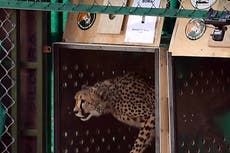Seventh cheetah dies in mysterious circumstances after being moved to India for reintroduction project
Latest death of an adult male is a significant setback for India’s efforts to bring back the animal, 70 years after its extinction in the country

India has lost its seventh cheetah since the start of an ambitious translocation project that aims to revive the wildcat’s population in South Asia, 70 years after it went extinct.
The project began last September, when eight cats were brought in from Namibia, while another 12 from South Africa were introduced this February.
Four of the original 20 cheetahs have now died, and another three cubs born to one of the adult females did not survive. A fourth cub is being bred in captivity and so will not be a part of the project in future.
The latest death of a male cheetah named Tejas, one of the South Africa contingent, is another setback less than 10 months after the project began in Kuno National Park in central Madhya Pradesh state.
Wildlife officials are yet to ascertain the manner of death for Tejas, who died after suffering serious neck injuries in his enclosure, officials said.
Principal chief conservator of forests JS Chouhan told The Independent that the monitoring team saw some injuries on Tejas’s neck on Tuesday morning around 11am local time while the cheetah was still inside its enclosure, and a team of veterinarians was rushed to investigate.
“The wounds were found to be serious by a team of wildlife doctors, but before we could take any action, the cheetah was found dead at the spot around 2pm,” Mr Chouhan said. Infighting between the cheetah and a female cheetah present in the same enclosure was a likely cause, he said.
The death was not the result of any violent interaction with other big mammals such as bears or leopards which are also present in the Kuno Palpur park area, Mr Chouhan said, almost 24 hours after officials conducted a thorough inspection of the surroundings.
“There are no pug marks in the area where Tejas moved yesterday, to suspect an ugly fight with a bigger animal. We have not seen any breach in the mesh of the enclosure,” he said.
An autopsy to ascertain what caused the fatal injuries was held on Wednesday, but the results have not yet been released.
It comes just two weeks after India nearly lost another cheetah after a violent territorial altercation between two coalitions formed by the big cats.
Officials from the forest department and veterinarians on the spot had to separate four cheetahs to stop a ferocious attack on a cheetah named Agni, which had to be taken to a medical facility to treat its wounds.
Wildlife experts have described the latest cheetah death as a serious alarm call for Indian officials, who have also seen deadly fights break out between the wild cats on other occasions.
Senior conservationist Valmik Thapar, who has monitored cheetahs in Africa for 25 years, told The Independent that the biggest drawback of the project – which was kickstarted personally by prime minister Narendra Modi with great fanfare – is the shroud of secrecy that hangs over it.
Journalists and activists have not been allowed inside Kuno national park since the beginning of the project, making it impossible to see what is actually happening to the wild animals.
“No one, outside a group of people, knows how these cheetahs are handled, how many are inside the park, how many are hanging on the boundaries of their enclosures, or the direct threats they are facing,” Mr Thapar said.
He said the project is being helmed in “complete darkness”.
“How do we know or not know if a leopard has jumped in or what exactly is happening to the remaining cheetahs day and night?” he asked.
Mr Thapar said there were also questions to be asked about having the project led by officials with no cheetah expertise.
The project has been ill-advised from the start as the cats face numerous challenges in a country they went extinct from in the 1960s, the wildlife expert said. “India has only seen captive cheetahs for more than 300 years before the ultimate decline, but what is more concerning is that India has not one official capable of giving a safe start to the lives of cheetahs who are now dying in Kuno,” he said.
Join our commenting forum
Join thought-provoking conversations, follow other Independent readers and see their replies
Comments




Bookmark popover
Removed from bookmarks